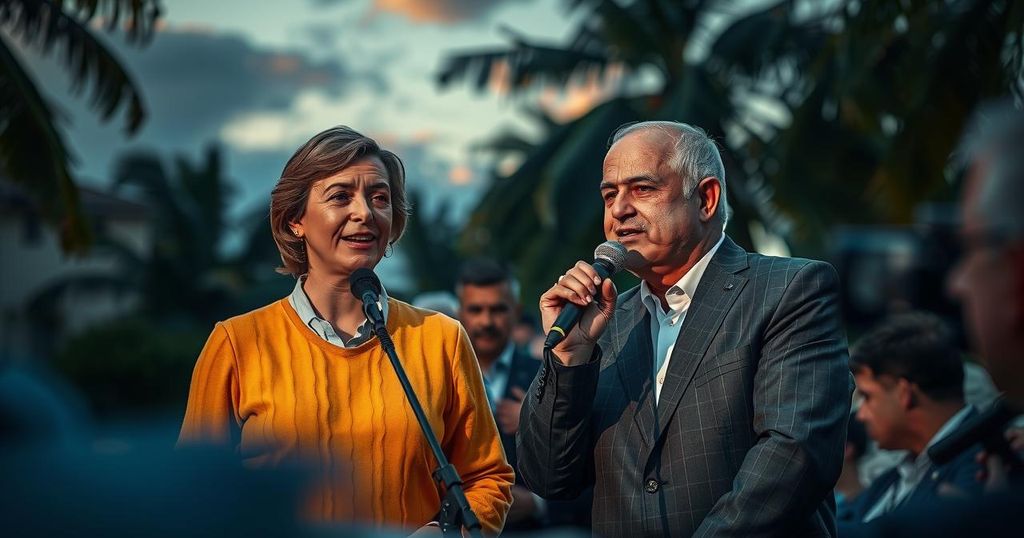Uruguay’s Presidential Election: A Testament to Stability and Moderation
Uruguay held a presidential election characterized by two moderate candidates, Álvaro Delgado and Yamandú Orsi, amidst a context of political stability and high voter turnout. The election was marked by broad consensus on key issues, contrasting with turmoil in the region. Additionally, a contentious social security reform referendum garnered significant attention. The results are set to shape the future of a nation known for its democratic values and moderate policies.
On Sunday, Montevideo, Uruguay held a pivotal presidential election amidst a political landscape defined by moderation and stability, contrasting sharply with the turmoil observed in neighboring countries. Approximately 2.7 million eligible citizens participated, casting votes not only for their new president but also for parliamentary candidates and a contentious referendum aimed at reforming the nation’s social security system. With a turnout surpassing 88% due to mandatory voting laws, the outcome of the election was anticipated shortly after the polls closed. Two main candidates emerged from the contest: Álvaro Delgado of the incumbent conservative coalition and Yamandú Orsi, representing a center-left alliance. This election epitomizes Uruguay’s commitment to moderation, as both candidates share similar views on critical issues, implying that a substantial shift in policy is unlikely. Uruguay’s stable political climate stands in stark contrast to the recent upheavals experienced in the region, specifically in Argentina and Brazil, where discontent with the political status quo has fueled electoral volatility. As a result, President Luis Lacalle Pou enjoys significant public approval, currently standing at 50%. While the candidates avoided the acrimonious rhetoric common in modern campaigns—such as those seen in the United States and Brazil—issues like child poverty, security, and educational reform were sidelined in favor of the impending social security referendum. Yamandú Orsi, who holds a competitive lead in the polls, expressed pride in his country’s democratic values, stating, “Uruguay has had the happiness for 40 uninterrupted years … the happiness that our citizens can elect their leaders.” Meanwhile, Álvaro Delgado emphasized the joy of participating in this election, reflecting on the spirit of respect and tolerance characteristic of Uruguay. Simultaneously, the election featured an innovative voice in Andrés Ojeda, who utilized media to engage younger voters, injecting a new dynamic into the political discourse. The referendum, however, remains a contentious issue, proposing an overhaul of the social security system that would significantly alter the nation’s fiscal policies. Voters face a complex decision, weighing the potential benefits of social reform against its economic implications. In summary, Uruguay’s election represents a significant moment of political continuity amid regional instability. As the nation upholds its reputation for moderation and democratic integrity, the results will not only shape local governance but also influence the broader South American context.
Uruguay has long been considered a model democracy in Latin America, characterized by its political stability and moderate governance. The nation has successfully transitioned from a military dictatorship restored to democracy in 1984, leading to nearly four decades of uninterrupted democratic rule. This stability is notable as many neighboring countries face severe political and economic crises, often leading to polarized electorates and volatile election cycles. Uruguay employs a compulsory voting system, which contributes to consistently high voter turnout rates, reflecting the population’s engagement in the democratic process. The election process has increasingly focused on pressing social issues, including poverty and crime, while also navigating the complexities of significant nationwide referendums.
The recent presidential election in Uruguay illustrates the country’s commitment to moderate governance and political stability, distinct from the turmoil seen in neighboring South American nations. Both candidates represent continuity rather than radical change, embodying a consensus that resonates with an electorate largely satisfied with the current administration’s performance. Moreover, the decision on the social security referendum may highlight critical fiscal challenges while offering voters the opportunity to shape the nation’s welfare policies. Overall, Uruguay stands as a bastion of democracy, characterized by respectful political engagement and public trust in the electoral process.
Original Source: www.pbs.org




Post Comment